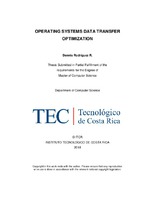Operating systems data transfer optimization
Resumen
Balancing algorithms challenge the state of the art on how data exchanges as messages between programs that execute in the kernel and the applications running on top in user space on a modern Operating System. There is always a possibility to improve the way applications that rely on different spaces in an Operating System can interact. Algorithms must be placed in the picture all the time when thinking about next-generation human interaction problems and which solutions they require. Artificial Intelligence, Computer Vision, Internet of Things, Autonomous Driving are all data-centric applications to solve the next human issues that require data to be transported efficiently and fast between different programs, no matter whether they reside in the kernel or in user space. Chip designs and physical boundaries are putting pressure on software solutions that can virtualize and optimize how data is exchanged. This research proposes to demonstrate - via experimentation techniques, designs, measurement and simulation - that in-place solutions for data optimization transfer between applications residing in different Operating System spaces can be compared and revised to improve their performance towards a data-centric technology world. Specifically, it explores the use of a simulated environment to create a set of archetypical scenarios using an experimental design which demonstrates that PF_RING optimizes data messages exchange between Operating System kernel and user space applications.
Descripción
Proyecto de Graduación (Maestría en Computación) Instituto Tecnológico de Costa Rica, Escuela de Ingeniería en Computación, 2018.
Compartir
Métricas
Colecciones
- Maestría en Computación [119]


